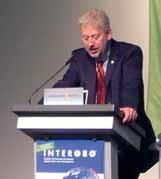Articles in the Articles Category

The most important achievement of the National Spatial Data Infrastructure (NSDI) has been bringing together many agencies to work for a cause. It had not been easy and it took more than ten years to reach at this stage. In addition, we were involved in the standards development activities of NSDI for Metadata (2005/2009) and National Spatial Data Exchange Standards (NSDE- 2003). NSDI is seen as Standards organization and Bureau of Indian Standards (BIS) is in the process of constituting a mirror committee for ISO TC 211 with NSDI as anchor.

GIS is becoming pervasive and is finding applications across a wide range of applications across the globe. It is becoming an effective language for communication. GIS companies like Esri are leveraging the advancements in information and communication technology and implementing GIS in multiple patterns like desk top, client server, federated, Web/Cloud and Mobile.
Over 650 years of experience in spatial information management, land administration and spatial enablement were percolated into 22 presentations offering a raft of initiatives and insights across the world corresponding with the theme of the forum, “Beyond Spatial Enablement’- Land Administration to support Spatially Enabled Government”
December 2011:
NSDI 2011, 21 – 23 December, Banglore, India,
www.nsdiindia.gov.in

Recent geodetic and oceanographic MSL studies have shown that neither the sea levels nor the land are permanent with respect to time variations. The data analysis of tide gauges produces ‘relative’ sea level changes. However, using tide gauge data alone, it is impossible to distinguish between any true sea level variation and any changes in ground level at a tide gauge site. GPS monitoring can be used to decouple vertical land movements from change in relative MSL, so that tide gauge can provide estimates of changes in absolute MSL. In order to monitor “absolute” changes in sea level, the rates of any vertical land movements at a tide gauge must be determined and subtracted from the resulting rate of tide records [e.g. IPCC, 2001 and Bingley et al, 2000]. Consequently, a sea level monitoring system has been installed at Alexandria tide gauge site containing a GPS receiver as a geodetic monitoring technique to perform this task.

The concepts proffered in paper generally are in relation to developed jurisdictions that have fully embraced the Information Age and its significant investments in digital data management. Since 2001, and as a means of improving the administration of marine and coastal spaces through decision support, interested members of the international geomatics community have increased research efforts towards the development of marine cadastres in various jurisdictions. Among them are researchers from Canada, Australia and the United States of America (USA) (Collier, Leahy and Williamson, 2001; Ng’ang’a, Sutherland and Nichols, 2002; Sutherland, Wilkins, and Nichols, 2002; Barry, Elema and van der Molen, 2003; Binns et al., 2003; Ng’ang’a et al., 2004; Sutherland, 2004; Sutherland and Nichols, 2004; FGDC, 2008). The main focus of this paper is Canada but developments from the U.S. and Australia are briefly discussed.

Since taking over the position of president of the International Association of Geodesy (IAG – http:// www.iag-aig.org) on the 6th July 2011, I have had on occasion mused on what geodesy “is” and how to explain this arcane field to those who are not acquainted with it. For example, how do I tell the Dean of the Faculty of Engineering, at the University of New South Wales, Sydney (Australia), that I, the head of a department within his faculty which has its primary objective the education of undergraduate students in “surveying” (or more broadly in “geomatics”), now occupy an important position in the geoscience field of “Geodesy and Geophysics”? (This is not an idle exercise, as the Dean will be asked to approve my increased travel commitments over the next four years

LightSquared is a gem! I am not only talking about its nationwide high-speed 4G capabilities and that it will be a boost to our lagging IT industry which has fallen behind 18 other nations. I am focusing on how it can beautifully complement high precision applications of GPS. It is a gem for GPS high precision users and for RTK.

After the three-day INTERGEO event in Nuremberg, one thing was clear: “INTERGEO is a platform for dialogue between technology users from a variety of sectors – dialogue that gives rise to new approaches and applications. The resultant scope of possible new uses is considerable,” stated Olaf Freier, Managing Director of HINTE GmbH and INTERGEO organiser. “There is quite simply no better specialist platform for suppliers and users to network than this leading international trade fair,” said Professor Karl-Friedrich Thöne, President of INTERGEO patron DVW e.V. – the German Society for Geodesy, Geoinformation and Land Management.










 (5.00 out of 5)
(5.00 out of 5)